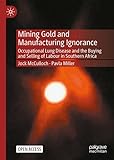Mining Gold and Manufacturing Ignorance [electronic resource] : Occupational Lung Disease and the Buying and Selling of Labour in Southern Africa / by Jock McCulloch, Pavla Miller.
Material type: TextPublisher: Singapore : Springer Nature Singapore : Imprint: Palgrave Macmillan, 2023Edition: 1st ed. 2023Description: XIII, 459 p. online resourceContent type:
TextPublisher: Singapore : Springer Nature Singapore : Imprint: Palgrave Macmillan, 2023Edition: 1st ed. 2023Description: XIII, 459 p. online resourceContent type: - text
- computer
- online resource
- 9789811983276
- 613.62 23
- RC963-969.2
Chapter 1: Introduction. -- Chapter 2: A most modern industry: the migrant labour system and crisis management: 1880 -2022 -- Chapter 3: Mapping and resolving a health crisis: 1902 -1929 -- Chapter 4: Identifying risk and compensating tuberculosis: 1916 - 1957 -- Chapter 5: Lifting the ban on the recruitment of Tropical labour: 1933-1945 -- Chapter 6: The research community, risk and evidence: 1912 - 1932 -- Chapter 7: Tuberculosis, malnutrition and mining in South Africa: 1903 - 1960,- Chapter 8: Tuberculosis and migrant labour in the High Commission Territories: Bechuanaland: 1985-1998 -- Chapter 9: Tuberculosis and migrant labour in the High Commission Territories: Basutoland and Swaziland: 1912-2005 -- Chapter 10: Contests over labour in British central African colonies: 1935 - 1953 -- Chapter 11: Dissenting voices: 1902 -1956 -- Chapter 12: The career of A. J. Orenstein: 1914 - -1960 -- Chapter 13: Technologies, care and repatriations: 1926-1966 -- Chapter 14: Things fall apart: independent research, asbestos litigation, and the gold miners’ class action: 1983 - 2019 -- Chapter 15: Conclusion: records, bodies and contested justice.
Open Access
This open access book charts how South Africa’s gold mines have systematically suppressed evidence of hazardous work practices and the risks associated with mining. For most of the twentieth century, South Africa was the world’s largest producer of gold. Although the country enjoyed a reputation for leading the world in occupational health legislation, the mining companies developed a system of medical surveillance and workers’ compensation which compromised the health of black gold miners, facilitated the spread of tuberculosis, and ravaged the communities and economies of labour-sending states. The culmination of two decades of meticulous archival research, this book exposes the making, contesting, and unravelling of the companies’ capacity to shape – and corrupt – medical knowledge.
There are no comments on this title.


